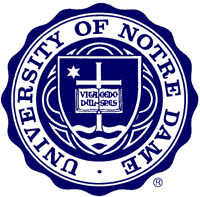
The following statement is from Rev. John I. Jenkins, C.S.C., president of the University of Notre Dame, in regard to the status of protesters who were arrested on campus last spring:
“In the weeks leading up to Notre Dame’s Commencement on May 17, 2009, a number of people violated University policies on campus demonstrations. They were given repeated warnings by law enforcement officials, and then, when they persisted, they were arrested and charged with Criminal Trespass.
“The prosecution of the resulting cases is in the hands of St. Joseph County Prosecutor, Mike Dvorak. The University has been in conversation with Mr. Dvorak’s office about these cases, and he has informed us by letter about how he will proceed. We believe Mr. Dvorak’s decisions are balanced and lenient.
“For all those who are eligible, Mr. Dvorak is offering the Pre-Trial Diversion Program, which gives individuals the chance to avoid a trial and have their cases dismissed with no record of a criminal conviction. To be eligible, a person must waive the right to a trial; have no criminal record; and agree to obey local, state, and federal laws for one year. The program also includes the payment of a fee for costs, but in his letter Mr. Dvorak assures us that his office will work with those who demonstrate financial need to reduce or even waive the fees. For those who successfully complete the program, the result will be as if the charges have been dropped. Those who have a criminal record are not eligible for this program and must either plead guilty or stand trial. While Notre Dame has in the past banned from campus those who have been arrested for trespass, the University will waive that penalty for those who complete the pre-trial diversion program, are acquitted of charges, or plead guilty.
“There has been significant interest in this case, so I would like to clarify two points. First, as I have made plain in my every public statement regarding Commencement, we at Notre Dame embrace the Catholic position on the sanctity of life. We oppose abortion, and support laws that protect life from conception to natural death. In this respect, we fully agree with the protestors.
“Second, some have incorrectly suggested that having the protestors arrested means we are hostile to the pro-life position. But, the University cannot have one set of rules for causes we oppose, and another more lenient set of rules for causes we support. We have one consistent set of rules for demonstrations on campus – no matter what the cause.
“We require that any campus demonstration, regardless of the issue, be organized by a student, faculty or staff member, receive approval from the University through the Office of Student Affairs, and be peaceful and orderly. Those who were arrested last spring met none of these criteria and, in particular, were led by individuals who threatened peace and order by promising upheaval on our campus. Several pro-life demonstrations that met our criteria were held on campus before and during Commencement. Those now charged with trespass could have joined these protests without interference or arrest. They were highly publicized, easily accessible, and well attended. These included a demonstration on April 5 in front of the Main Building; a Eucharistic adoration from May 16 to May 17 in one of the residence hall chapels; and on Commencement day, a Mass, a rally, and a prayer vigil on South Quad and a Rosary and meditation at the Grotto. Nearly 3,000 people participated in the prayerful protest on the South Quad. Each of these events was open to the general public and none of the participants in any of these activities were arrested.
“At Notre Dame, we welcome passionate debate of public issues. Indeed, we welcome protest, and we have great respect for people who engage in the long and noble tradition of civil disobedience and courageously accept the consequences to call attention to themselves and their message. Yet we must insist on maintaining the order that allows students, faculty, and staff to learn, inquire, and conduct the business of the University. It is this dual commitment to free expression and public order that has guided us in this case.”